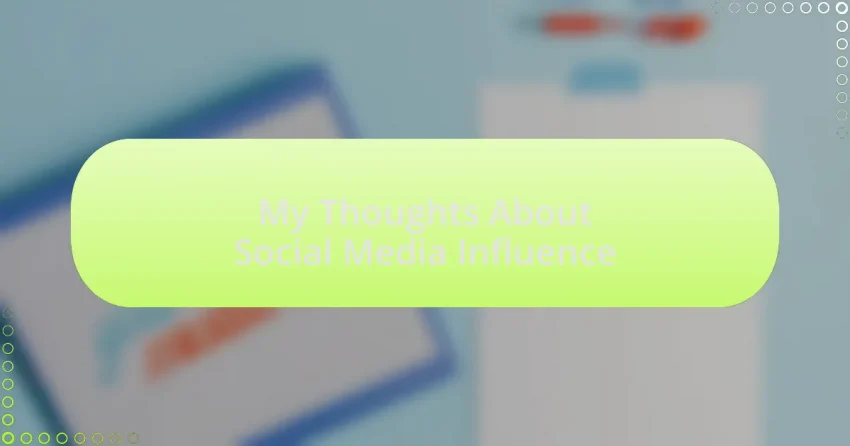Key takeaways:
- Social media is a powerful tool that can mobilize individuals and spread misinformation, making it essential to discern credible content.
- Engaging on social media fosters community, amplifies voices, and drives awareness on important political issues.
- Risks include the spread of misleading information and the creation of echo chambers, which hinder meaningful dialogue across differing viewpoints.
- Anonymity on social media can lead to aggressive behavior, stifling constructive conversations and deterring open expression.
Author: Evelyn Hartwood
Bio: Evelyn Hartwood is an acclaimed author known for her enchanting tales that blend magical realism with poignant human experiences. With a degree in Literature from the University of California, Berkeley, she has captivated readers worldwide with her lyrical prose and richly developed characters. Evelyn has published three best-selling novels, including “Whispers of the Willow” and “The Echoing Silence,” both praised for their emotional depth and imaginative storytelling. When she’s not writing, Evelyn enjoys exploring the outdoors, indulging her passion for nature photography, and hosting workshops that inspire aspiring writers. She currently resides in a quaint cabin in the Pacific Northwest, where she finds endless inspiration among the towering trees and serene landscapes.
Understanding social media influence
Social media influence is a double-edged sword. On one hand, it empowers individuals to voice their opinions and mobilize others. I still remember when a single tweet ignited a local protest, demonstrating just how powerful a few words in 280 characters can be.
Consider for a moment how quickly misinformation spreads online. I’ve seen friends share posts that sparked outrage, only to realize later they were based on misleading facts. It raises an important question: how do we discern what’s credible in a sea of opinions? This constant battle for truth makes it crucial for us to be discerning consumers of social media content.
Many times, I find myself reflecting on the emotional weight social media carries. It can foster community and solidarity, yet it also breeds division and conflict. Have you ever felt the thrill of a like or the sting of a negative comment? This emotional rollercoaster reveals just how deeply social media can affect our perceptions of each other and the political landscape.
Benefits of social media engagement
Engaging on social media offers a unique pathway for individuals to connect with like-minded people. I remember participating in an Instagram live session focused on climate change, where everyone shared their insights and felt empowered to make a difference. This collaborative spirit can amplify individual voices, creating a sense of belonging that is especially important in today’s fragmented political climate.
The beauty of social media engagement lies in its ability to spread awareness rapidly. I once shared a post about a local candidate who prioritized environmental issues, and I was amazed at how quickly my friends began discussing it. This kind of organic discussion helps people become informed about critical political matters, driving conversations that can lead to real-world action.
Moreover, social media serves as a platform for accountability. When I see activists documenting their efforts online, it inspires me to hold my own representatives accountable. Isn’t it powerful to think that a tweet can challenge an old narrative, forcing politicians to respond to their constituents? This engagement fuels a more responsive political landscape, reminding us all that our voices matter.
Risks of social media influence
Social media, while a powerful tool, also carries significant risks that can distort public perception. I recall a time when a viral post presented misleading information about a politician’s record. This misinformation didn’t just spread quickly; it shaped my friends’ opinions before they even sought the truth. How alarming is it to think that one inaccurate post can influence voter behavior?
Another risk lies in the echo chambers that form around like-minded individuals. I saw this firsthand when I joined a political group focusing exclusively on one party’s views. The more time I spent there, the more I realized our discussions became increasingly polarized. It made me wonder—are we leaning into ignorance rather than understanding? Social media can enhance these divides, making it harder for us to engage in meaningful dialogue with those who think differently.
Moreover, the anonymity of social media often fuels aggressive behavior, which in turn deters constructive conversations. I had an experience where I shared a nuanced opinion on a controversial topic and was met with harsh criticism. This negativity can silence voices that might otherwise contribute positively to political discourse. How can we cultivate a healthy online environment when fear of backlash stifles open expression?
